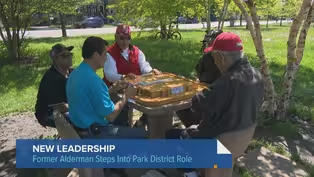
Judge Finds Cause to Hold Trump Administration in Criminal Contempt
Clip: 4/17/2025 | 8m 24sVideo has Closed Captions
The administration defied a court order when it failed to turn around a plane full of deportees.
A federal judge on Wednesday said he has found probable cause to hold the Trump administration in criminal contempt of court and warned he could seek officials' prosecution for violating his orders last month to turn around planes carrying deportees to an El Salvador prison.
Problems playing video? | Closed Captioning Feedback
Problems playing video? | Closed Captioning Feedback
Chicago Tonight is a local public television program presented by WTTW
WTTW video streaming support provided by members and sponsors.

Judge Finds Cause to Hold Trump Administration in Criminal Contempt
Clip: 4/17/2025 | 8m 24sVideo has Closed Captions
A federal judge on Wednesday said he has found probable cause to hold the Trump administration in criminal contempt of court and warned he could seek officials' prosecution for violating his orders last month to turn around planes carrying deportees to an El Salvador prison.
Problems playing video? | Closed Captioning Feedback
How to Watch Chicago Tonight
Chicago Tonight is available to stream on pbs.org and the free PBS App, available on iPhone, Apple TV, Android TV, Android smartphones, Amazon Fire TV, Amazon Fire Tablet, Roku, Samsung Smart TV, and Vizio.

WTTW News Explains
In this Emmy Award-winning series, WTTW News tackles your questions — big and small — about life in the Chicago area. Our video animations guide you through local government, city history, public utilities and everything in between.Providing Support for PBS.org
Learn Moreabout PBS online sponsorship>> federal judge says the Trump administration defied a court order when it failed to turn around a plane full of deportees in route to a mega prison in El Salvador.
The judge has given Trump officials one week to comply or risk being found in contempt escalating illegal standoff over whether the U.S. government rushed to deport individuals under the Alien enemies Act.
Joining us via zoom are Steven Schwinn, a professor of law at the University of Illinois, Chicago and Aaron's Omar acting chair of the Illinois Republican Party.
Gentlemen, thank you for joining us.
Steven Schwinn.
Let's start with you, please.
Us District Judge James Boasberg found probable cause yesterday to hold the Trump administration in contempt of court.
What does that actually mean?
And what could the consequences be?
>> Well, thanks innocence for having us today.
He judge in the case how that there was probable cause that officials in the Trump administration were in contempt of court for violating the court order to return people.
Then they deported to El Salvador back to the United States.
judge also gave the administration a chance to what we called sure this contempt of court.
So the administration has some time to bring them back to the United States is not the judge outlined plans to go forward and told administration officials in contempt.
>> But they could be held in contempt.
Is there a consequence for that?
Sometimes in a criminal court to somebody spend like a night in jail if they are held in contempt order, what could happen?
>> That's exactly right.
So there could be fines or even jail terms for individuals who are held in contempt out.
That's highly unusual.
We almost never see that with officials in administration, but that's not to say that court couldn't do it.
Then there's a question of enforcement.
If the judge issues a criminal contempt order, usually its the executive branch itself that would enforce that order.
But in this case, the executive friend branch, of course, is led by President Trump.
So it's not at all clear that his executive branch would enforce the order.
>> Erin, do Margie think the administration is acting too aggressively and it's deportation plans and then mistakes are happening.
>> I think that any time you're trying to rapidly deploy a new policy or program and such as the Trump administration is looking at immigration.
When you move that there's a lot of opportunity from our air.
And I think in this situation they might have acted a little bit faster than normal.
And now they are having to address Those concerns in federal court.
You know, one thing that she forgot to mention of that, that since this is in federal court, and if they they are found in contempt.
That doesn't mean the President Trump can't pardon them from This is a state action case.
That is something that he would have no power to do.
You need the governor, but this situation, even if there was a consequence and somebody was found guilty of to top, that could be easier raised by pardon from the president.
>> Okay.
Interesting point on Stevens when dozens of individuals we know have been deported under the Alien enemies act.
What is the intent of that law?
>> Well, goes back to the late 18th century.
This is a very old lot.
So wartime authority that Congress to the president to deport individuals who are affiliated with a foreign country and invading countries or at a time when we're at This is only been used 3 times in our country's history during the war of 18, 12 during World War One and during World War 2, this assertion of authority really is unusual and extraordinary.
>> What does the formal process of deportation typically look like Stephen?
>> So typically individuals or subject to deportation due process before they are deported.
Each and due process opportunity before an administrative officer judge on panel of judges or the federal courts to challenge the basis of their deportation and to argue that they shouldn't be deported because they have a well-founded fear of persecution in the country deportation based on certain characteristics.
>> Aaron, it seems for the president so far has been to use his authority.
And then sometimes that authority is then challenged in court.
We know the court process can take some time.
But what is the enforcement mechanism when the court makes a ruling?
But if the administration chooses to ignore it?
>> I think at some point we're gonna come to a very strong constitutional crisis here where we're going to see the judicial branch.
I'm trying to rein in and give guardrails to the executive branch and the president.
I think President Trump is really trying to good on his promise during the campaign that he was gonna have large-scale deportations that he's running into.
A lot of interference from a lot of local municipalities and different sanctuary cities.
that in mind, he's trying to move at a very pace.
Unfortunately, if you're looking at the strictly by the math, he's not even meeting the deportations that President Obama did in 2008 to 2012.
And so I think there's a lot of frustration that it's happening.
So there's a lot of start, something of the federal judiciary in order to try to make good on the campaign promise.
>> Do you think that his supporters would like to see would like to see even more people being deported?
And that's why this rapid clip is happening.
>> think that the Republican Party in general is not monolithic.
I think that there's different factions within the party just like the Democratic Party has different parts.
And there is a subsection of the party that wants to see more deportations.
I think people are very frustrated with the impact specifically in Chicago over the amount undocumented citizens that were brought into Chicago during a very short period time and the pressure that put on our public services.
And, you know, the availability for those that are already here not having access to those in on even those resources be entitled on by the influx of very short period of time of people.
So, yeah, there's certainly there.
But I think a lot of people still believe our system of immigration.
I think there's people to believe that each of these immigrants should have their day in court to be able to to make their case why they should stay in the United States.
I think that we just as United States come up with a more clearly understood immigration policy and be able do that through about Carol process for Congress.
>> Now that said the administration has called the deportation of kill Garcia, an administrative error.
But they have also said that now that he is in this prison El Salvador, that they no longer no longer have jurisdiction.
>> and he does not have asylum, but he has been granted protection by an immigration judge from deportation.
Stephen, it.
What do you think of the tactics the administration is deploying in this particular case?
>> Well, thanks for They're highly unusual.
So ordinarily, when the administration makes mistake with deportation, they act quickly to bring the person back to the United States and give them the kind of due process that we've been talking about.
In this instance, the Trump administration has said that they'll have the authority to do that because he's now the authority of a foreign sovereign the Again, that's a highly unusual stance to take.
We really haven't seen an administration take that kind of stance with regard to unlawfully deported individual be sore.
>> Erin.
Trump has also said that he is he's floated the eye idea of deporting or detaining, quote, homegrown threats to prisons abroad, homegrown meaning American citizens.
What is your reaction to that idea?
>> Well, as somebody that has a father that immigrated here from the Philippines in the early 70's, I mean, that's really draws conclusions.
But I wouldn't even think you know, the United States has a long history of accepting immigrants from all different parts of the world ending engaging in assimilating into our society.
And I think that's one of the reasons that were most strongest country in the world.
And I think that those different groups make America what we are today, the idea that you're going to have a southerly person here that has and the American sedition bright has a passport.
And then we're going to start reporting on.
I think that's highly unlikely.
I think there's 11 million undocumented.
Immigrants that are here in the United States right now.
And I think that's going to be the focal point of enforcing our existing immigration plan and then looking to see what we can do to strengthen our borders and make sure that the people that we are living in are going to be out and value to the everyday American life.
>> Ok, ongoing topic of discussion for the 2 of you.
Carlos Ramirez-Rosa Talks New Job as Chicago Park District CEO
Video has Closed Captions
Clip: 4/17/2025 | 7m 27s | The former 35th Ward alderperson has taken on a new role. (7m 27s)
Chicago History Museum to Explore Latino Stories in New Exhibit
Video has Closed Captions
Clip: 4/17/2025 | 4m 1s | WTTW News got an exclusive preview of an exhibit still in development. (4m 1s)
Providing Support for PBS.org
Learn Moreabout PBS online sponsorshipSupport for PBS provided by:
Chicago Tonight is a local public television program presented by WTTW
WTTW video streaming support provided by members and sponsors.













